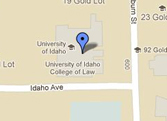College of Law
Moscow

uilaw@uidaho.edu
Administration Office: 208-885-2255
Dean’s Office: 208-885-4977
fax: 208-885-5709
Menard 101
711 S. Rayburn Drive
Mailing Address:
College of Law
University of Idaho
875 Perimeter Drive MS 2321
Moscow, ID 83844-2321
Boise
First Monday - June 2, 2008
In this issue:
- “Second Century” Update: Current Status and Statement by the Chair of the Law Advisory Council
- Combining Theory and Practice: Students Take Advantage of Real World Opportunities, Earn Plaudits from Lawyers and Judges
“Second Century” Update: Current Status and Statement by the Chair of the Law Advisory Council
On April 17, 2008, the University of Idaho Board of Regents (State Board of Education), voted “to approve the request by the University of Idaho for authority to proceed with implementation planning for the two-location concept, including operating budget, capital budget, facility needs analysis, curriculum and an implementation timeline.” The College of Law has composed a summer working group within its “second century” committee to prepare the implementation plan. The College also is collaborating with the Idaho Supreme Court in the early design and planning phase of an “Idaho Law Learning Center” – a multipurpose facility that will provide a home for an improved State Law Library, a location for the College’s J.D. program in Boise, and a place of service outreach to other branches of government as well as education for the general public on the rule of law in a democratic society. An informational update on the College’s implementation planning process will be provided to the State Board in June, and a proposed implementation plan is expected to be submitted later for Board consideration during its meeting in August.
Statement by Chair of the Law Advisory Council
The “second century” process has been guided in significant part by the deliberations and recommendation of the College’s Law Advisory Council. The following statement recently was prepared by the Council’s chairperson, Hon. Linda Copple Trout, past Chief Justice of the Idaho Supreme Court, for distribution to the media:
The University of Idaho College of Law will celebrate its centennial in 2009, and recently the College completed strategic planning for its "second century." In my role as chair of the College's Law Advisory Council, I've had the opportunity to be closely involved in this effort to plan for the future.
The process has been candid and inclusive, engaging the College of Law community, university leaders, distinguished alumni, the judiciary, the Idaho State Bar, district bar associations and national experts.
The work product, a concept of offering legal education in two locations -- Moscow and Boise -- under the unified administration of the University of Idaho, was recently presented to the State Board of Education, which authorized the next steps to flesh out the plan.
In order to fulfill its statewide mission, the university must respond to rapid growth and changes in Idaho, as well as to emerging trends in American legal education. A status quo approach will not be adequate in the "second century," as the college prepares students to provide counsel, advice and knowledge in an expanding global business environment.
The Law Advisory Council has endorsed enthusiastically the bold vision of high-quality legal education in Idaho offered in a coordinated, complementary fashion at both Moscow and Boise. The two locations will likely offer different emphases within an overall curriculum shaped by a unified faculty in the College of Law, and administered from Moscow as an integral part of the University of Idaho. The Boise location could feature a unique collaboration with the Idaho Supreme Court in creating an "Idaho Law Learning Center." The educational program would be developed gradually and with emphasis on quality, reflecting the depth of the student applicant pool and the availability of public and private resources.
Some observers might ask whether Idaho needs to educate more lawyers. I offer the following for consideration:
- Legal education is not limited to preparation for the practice of law. The Juris Doctor degree is a key that unlocks many doors of career opportunity such as business, teaching, public administration and social services.
- Idaho has a growing need for legal expertise in the new economy. The need is not only for high-end specialists but also for attorneys who will represent small businesses and Idahoans of ordinary means, who will undertake careers of public service, or who will work in the nonprofit sector. These fields depend on cost-effective public legal education as a source of graduates with reasonable debt loads and a service-oriented view of the profession.
- The size of Idaho's law school has not changed materially in 35 years, despite a doubling of the state's population and even larger growth of economic and government activity. Keeping educational opportunities in Idaho to the level of need from the 1970s does not constrain the size of the practicing bar in our state -- lawyers and law graduates come from elsewhere -- but it does affect the debt loads, fees, and service perspectives of the lawyers who practice here. We need to invest in our own.
Fulfilling the statewide legal education mission of the University of Idaho demands the orderly development of a full law program in the Treasure Valley while maintaining the quality of the program in Moscow. The university's leadership has undertaken an exhaustive, thoughtful process that has produced a sound and important plan. It is a plan that will benefit Idaho, its citizens, businesses and government, for the next century.
Further information about the “second century” process is available on the College of Law website , or from Dean Burnett (dburnett@uidaho.edu). Information about the Law Advisory Council.
Combining Theory and Practice: Students Take Advantage of Real World Opportunities, Earn Plaudits from Lawyers and Judges
The College of Law provides summer externship opportunities enabling students to perform non-salaried but credit-generating, supervised legal work – generally in public service settings. (The externship program is not to be confused with the College’s distinctive pro bono service program, in which all students perform a substantial work of donated legal service without compensation and without credit hours.). In the current summer (2008), the College has enrolled a record 55 students in the externship program, working with attorneys throughout Idaho as well as in Washington, California, Alaska, New Mexico, Washington D.C., and Madrid, Spain.
The College also provides a fuller opportunity for students to spend their entire final semester earning credit for sixteen weeks of practice in a public service setting, under the personal mentoring and supervision of selected lawyers and judges in Idaho. Ten students participated in the spring 2008 semester-in-practice program. Nine of the students worked in Boise and one in Rupert. Six of the students worked for judges – four at the federal court, one for the Chief Justice of the Idaho Supreme Court, and another for a state district court judge. Students also worked at the Ada County Public Defender’s Office, the Boise City Attorney’s Office, Idaho Legal Aid, and the Office of General Counsel at Boise State University.
Written evaluations are required. Without exception, the supervising judges and attorneys enthusiastically endorsed our students and the program. All of the UI law students received “excellent” or “exceptional” ratings of their abilities. One of the supervisors was so impressed that he extended an employment offer to the student. Here is a sample of the supervisors’ comments:
“The quality of [the student’s] work was outstanding and [the student] always acted in a very professional manner.”
“I have no suggestions [for the program] but want to express my appreciation for sending [the student] our way.”
“I have been very satisfied with [the student] and with all other placements from U of I. Thank you very much for placing [the student] here for these past months!”
The law school’s program “functions very well with a mixture of class work and extern assignments in chambers.”
“The gulf between the academic setting and the real-life application of one’s professional education can sometimes be daunting, but [the student] bridged the chasm easily.”
The student’s “ability to analyze the purposes and function of the law and to discern underlying premises and implicit assumptions of the law and legal systems is second to none. [The student] demonstrated impressive depth and maturity in addressing complex legal issues.”
“[The student] demonstrated advanced skills in identifying legal issues and independently analyzing complex matters. [The student] gave 100% to his job and he was truly a pleasure to work with each and every day.”
The student “was quite willing to take on as much as we were willing to send his way, and worked diligently at tasks assigned . . . was an asset to the work here from the beginning.”
Student’s “time with our office has been excellent and exceptional from day one. He is collegial, collaborative, insightful, energetic, efficient, knowledgeable, intuitive and wise. I know that this all sounds like an inflated evaluation, but he truly deserves all of this praise. We have encouraged him to apply for employment with our office when we have an opening.”
Further information about externships and the semester-in-practice program may be obtained from Lee Dillion (dillion@uidaho.edu), instructor and outreach director, and from Katherine Ball (ktball@uidaho.edu), externship coordinator.


